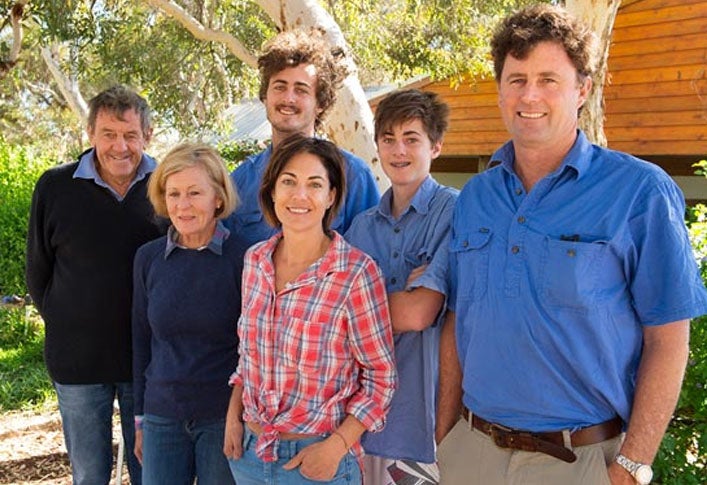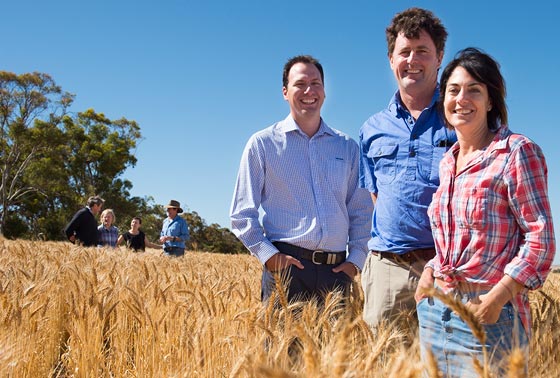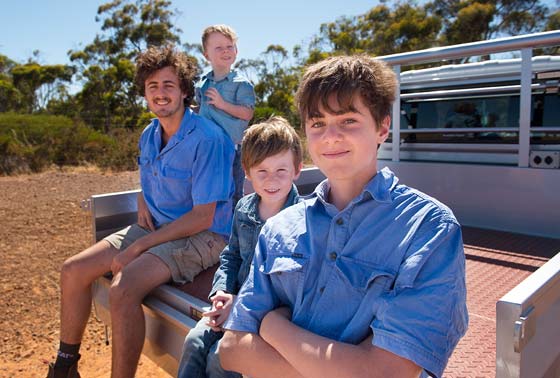Posted by on
12/05/2022
John Scotney was working as an accountant in London in the early 90s when his father called him home with the opportunity to take on the running of their recently purchased property ‘Warialda’, in the west midlands cropping area of Western Australia.
More than a quarter of century on and John and his wife Emma have greatly increased the productivity of their farm through improving infrastructure and better understanding the soils and weather patterns that influence their farming region.
They have also expanded their operations, purchasing neighbouring farms, and most recently collaborating with John’s family to purchase a western livestock property.

An evolution in cropping
Currently farming 4500 hectares and running around 5000 head of doonie ewes Mr Scotney said their gradual move from being weighted heavily toward livestock to more of a cropping focus has been enabled through improved farming techniques.
“Of course, the big win in the early days for us was the move from minimum till to no-till farming,” he said.
“It has provided a lot more flexibility in terms of the timing of planting and, given the changing patterns of weather in our region, having that flexibility is imperative.”
“If you look at a season like last year when there was a really tough start, in previous years we might not have even had a crop in the ground but with improved techniques in planting, and also the improvement in our soil, we were able to take advantage of the rain when it did show up.”
Strength in numbers
Addressing the issue of ‘non-wetting’ soils has been one that has faced many producers in the region that the Scotneys farm and as Chairman of the West Midlands Farming Group it is a challenge that John said has been best tackled as a group.
“Various projects looking at the issue of non-wetting soils in the west midlands have been running since the early 2000s and we have already seen a lot of improvement in that time,” he said.
“While no-till farming has had so many benefits we did stop working the soil and have since had to reintroduce some of that mechanisation to combat the issue of non-wetting soils."
“Members across the West Midlands Group have trialled mould boarding, spading, and claying as well as incorporating ameliorants such as lime.”
“The results have varied but we’ve seen yield increases of up to 30 per cent.”
Mr Scotney said the fast adoption of effective soil amelioration techniques has in many ways been made possible by the strength in numbers that comes with being a member of a grower group.
“We’re fortunate in our Grower Group to have a broad range of members, including a lot of younger farmers,” he said.
“We currently have around 140 members from around the West Midlands and a broad range of research topics that we cover under the Grower Group umbrella."
“Along with research and development into non-wetting soils we are looking also conducting our own trials on fungicides and chemical regimes and there are a number of sub committees that operate."
“We have a livestock committee looking at topics such as pasture production, perennials, and beef backgrounding as well the West Midland’s Women in Agriculture Committee, which has strong representation, particularly with their regularly hosted ‘Women, Wellbeing and Wine’ events.”

Balancing business, career, and family
Emma Scotney will be just one of around 100 women from the West Midlands Group who will be attending the next Women, Wellbeing and Wine event, to be held in a couple of weeks.
“These events are a great opportunity to connect with women working on farms and in agriculture in the region, we always get a great attendance even though it’s often difficult for most of these women to take time out of their businesses to attend,” she said.
Along with helping John run their substantial grain and livestock operation Ms Scotney works as a solicitor for four days a week. It’s a juggling act that Ms Scotney says is both challenging and rewarding.
“I work from Perth for three days and then work from the farm for the other day of the week,” she said.
“It does involve a lot of scheduling, I basically have to fit anything to do with the office management of our business into a single day of the week.”
“We try and make sure that we schedule staff meetings, safety inductions, pre-seeding and pre-harvest meetings on days when I can ensure I’m there.”
John and Emma have three boys who until recently have all been located in Perth, with their youngest still attending high school, their elder two sons are studying at university with their eldest moving to the east coast this year to study medicine at the University of Sydney.
“While the boys have always come home to give us a hand in school holidays and are a great help on the farm I think it is still a bit soon to say if they will end up returning to agriculture.”
Expansion and consolidation
With involvement from the next generation and talk of succession still some way off for the Scotneys, they are entering what Mr Scotney is describing as a ‘consolidation stage’.
“We’ve made a couple of large purchases recently, the livestock property out west requires a fair bit of intensification work to be done and with the neighbouring farm recently purchased, we have a lot of work ahead to bring it up to the standard of the rest of our operations,” he said.
With an ever-changing agricultural landscape and fluctuating demand for capital Mr Scotney said they have a strong appreciation for their financial partner.
“My whole family has been with Rabobank since back in the PIBA days, more than 25 years, and we’ve never had any real reason to look elsewhere,”
“Rabo has always been competitive with both their rates and terms, we’ve always had a good working relationship with their managers and their All-in-One product really suits our business structure.
“Being a solely rural bank and bringing that focus on farming really works well and the global knowledge and perspective that Rabobank provide us would be very hard to find anywhere else.”
